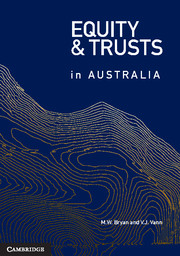Book contents
- Frontmatter
- Contents
- Preface
- Table of Cases
- Table of Statutes
- Abbreviations
- Part A Introduction
- Part B Equitable Remedies
- 2 An Introduction to Equitable Remedies
- 3 Specific Performance, Injunctions and Equitable Damages
- 4 Monetary Remedies in Equity
- 5 Rescission, Rectification and Declarations
- 6 Bars to Relief
- Part C Equity, Contract and Property
- Part D Equitable Obligations
- Part E Express Trusts
- Part F Performing the Trust
- Part G Breach of Trust
- Part H Non-Consensual Trusts
- Index
- References
4 - Monetary Remedies in Equity
from Part B - Equitable Remedies
- Frontmatter
- Contents
- Preface
- Table of Cases
- Table of Statutes
- Abbreviations
- Part A Introduction
- Part B Equitable Remedies
- 2 An Introduction to Equitable Remedies
- 3 Specific Performance, Injunctions and Equitable Damages
- 4 Monetary Remedies in Equity
- 5 Rescission, Rectification and Declarations
- 6 Bars to Relief
- Part C Equity, Contract and Property
- Part D Equitable Obligations
- Part E Express Trusts
- Part F Performing the Trust
- Part G Breach of Trust
- Part H Non-Consensual Trusts
- Index
- References
Summary
In certain situations equity orders the defendant to make payments to the plaintiff as a remedy for the wrong done. These are orders for the defendant to account for profits made, or pay equitable compensation to the plaintiff. These remedies impose a personal obligation on the wrongdoer to pay and do not per se attach to property. This is their disadvantage compared to proprietary remedies in the case of the defendant's insolvency. The remedies perform substantially different tasks. We will now look at each remedy in turn.
Accounts of profits
As a general rule, accounts of profits are not available at common law. They are designed to strip profits made in breach of equitable obligations, preventing the wrongdoer profiting from his own wrong. The remedy is awarded in response to breaches of trust, fiduciary obligations and the obligation of confidence. The essence of the plaintiff's complaint is that the defendant has usurped a profit-making opportunity that should have come to the plaintiff alone (if to anyone at all); justice requires the profit made be removed from the defendant and directed to the plaintiff. However, the remedy is not designed to punish the defendant. As with all equitable remedies it is designed to do corrective justice between the parties. Therefore, only net profits are stripped from the defendant. Although the defendant cannot profit from his wrong he should not be put in a worse position than if he had not taken up the opportunity.
- Type
- Chapter
- Information
- Equity and Trusts in Australia , pp. 56 - 70Publisher: Cambridge University PressPrint publication year: 2012



